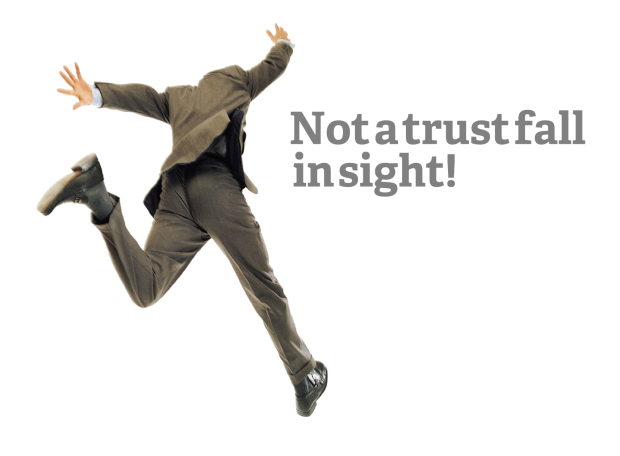
Bizprov is a boutique consultancy that began in 2010. President Jay Rhoderick has many years of training business people in creative methods of communicating and collaborating. Its theoretical underpinning is the discipline of improvisation. Bizprov believes that all business challenges can be addressed with more flexibility—and more fun—through improvisation. We aim to make the vague and often undervalued skill of improvisation an essential part of how our clients think, work, collaborate and create.
It’s a fun and unforgettable way to train and develop stronger teams and more confident speakers.
FAQ’s
What’ll this workshop experience feel like? Trust falls and tug-o-war?
Um no. The experience of a typical workshop might look something like this:
- Everyone gathers in a comfortable room in comfortable shoes and we talk a bit about their experience and expectations.
- We’ll do some physical loosening up. No jumping around like bunnies.
- We practice looking and listening to each other in new ways.
- We play with some grown-up games designed to connect us (not to cause shy folks to shut down or roll their eyes).
- We will play some guided story-based listening exercises in pairs.
- We’ll introduce essential practices of improv: saying “yes, and “, seeing and accepting “offers”, finding the narrative and the hidden game, etc.
- We’ll play some small-group idea-stimulation games.
- We may (or may not) do some forum-style role-playing to address specific situations at work—or to anticipate upcoming issues.
- We throw lots of curveballs—surprises that force some real adaptation in the moment. Nothing life- (or ego-) threatening.
- We’ll introducing fun non-work texts or give impromptu suggestions to practice impactful presentations.
- We skillfully coach in-the-moment and coax you out of your comfort zone into a bolder version of how you communicate with an audience.
- We culminate the day with a project/performance or shared feat that’s very specific to the group and what they want out of the day.
- We do lots of checking-in, debriefing, and intelligently connecting this experience and the skills you’re using to the real world of work.
- The day is highly structured, but at the same time must allow for give-and-take. We practice what we preach.
Is this going to be silly or embarrassing?
If you have the willingness and time to invest in our approach, you’ll get a huge return on the investment—along with lots of laughs. No one will be made a fool of, though we will be outside most people’s normal M.O.. We believe this playful approach to learning, while not commonly found in offices, is incredibly accessible and successful because it’s not found everywhere. If we had a motto, it would be: Facilitate, don’t humiliate!
Is this serious, or is it “soft skills”?
Both. The soft skill of building trust and relationships is subjective, but learnable. It’s also emotional intelligence. And it’s definitely not therapy, but may feel therapeutic.
What are the real-world business benefits?
The stats say that the average professional attends 62 meetings per month, and often half that time is wasted through inefficient communication or just plain boredom. At an hour per meeting, that makes 31 hours of wasted time.
Our work is about real-world application. Just because we’re laughing doesn’t mean we’re not learning or developing practical skills. We couch our exercise in the context of how, say, active listening would look and sound in one of those boring meetings. We connect the dots and draw a clear line between the workshop analog and a real-world client pitch or negotiation.
Once you’ve been energized in an improv-based workshop, you’ll know how to bring that energy to the meetings you run or attend. If you’ve found the courage to improvise bold new ideas, you can act as a leader and model creativity for others as soon as you return to work.
In this still-rough economy, the survivors are emphasizing productivity and adaptability. By using the core principles of improvisation – collaboration, communication, creativity and joy – workers react more flexibly and spontaneously, and they become change agents for their firms. They also are less freaked out by surprises and find ways to manage people and projects more openly, with less tension. They’re in the moment but also forward-thinking. They create value for the firm.
How would I know it’s working? Is there support afterward?
Clients at Columbia Law School tell us that they are getting more and faster job offers based on our coaching. Branding strategy team clients tell us they immediately applied some of the story-generation concepts to branding campaigns and felt their creativity ignite. Splintered and siloed teams report that a few months after the workshop, they still remember the moment they began to see themselves as a unit, rather than a confederation of disparate units. Most gratifyingly, many of our public-speaking-averse clients (that is: everyone) tell us that the workshop provided the painless but firm nudge out of their shell and into greater visibility at work.
We develop specific post-workshop action plans and offer clients follow-up 1-to-1 coaching, by Skype, phone, or live. We are happy to include evaluation surveys at the completion of the day, or even months later to measure the developments.
What can I read to learn more about improvisation’s rational basis?
There is much research around play, story, and improvisation, and how those relate to business and communication. A few selected favorites:
Improvisation for the Theater (Viola Spolin, 1999)
“Whose Classroom is it Anyway? Improvisation as a Teaching Tool” (Ronald A. Berk The Johns Hopkins University and Rosalind H. Trieber, Towson University, 2007)
“Leadership Agility: Using Improv to Build Critical Skills” (Kip Kelly, UNC Kenan-Flagler Business School, 2012)
A Whole New Mind: Why Right-Brainers Will Rule the Future (Daniel Pink, 2007)
From Workplace to Playspace (Pamela Meyer, 2010)
What’s the cost?
All our programs and coaching are bespoke (a fancy-schmancy word for “customized”). Contact us for a quote.
